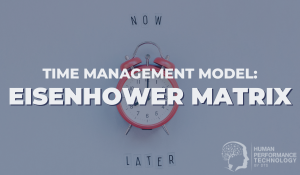Time Management Model: The ABC Method
The ABC method is a time management model that involves prioritising tasks based on their importance and urgency. The model is commonly attributed to Alan Lakein, a time management expert and author of the book “How to Get Control of Your Time and Your Life,” first published in 1973.
To apply the ABC method time management model, you can follow these steps:
- List your Tasks - Write down all of the tasks that you need to complete.
- Assign Priorities - Assign each task a priority level using the following criteria:
- A: Tasks that are urgent and important
- B: Tasks that are important but not urgent
- C: Tasks that are neither urgent nor important
- Focus on High-Priority Tasks - Focus on completing the A tasks first before moving on to B and C tasks.
- Re-Evaluate Priorities - Re-evaluate your priorities on a regular basis, as tasks may change in urgency and importance.
- Avoid Procrastination - Avoid procrastination by focusing on completing high-priority tasks and avoiding distractions.
By following these steps, you can use the ABC method to prioritise your tasks, manage your time more effectively, and improve your productivity. The method is designed to help you focus on completing the most important tasks first while still allowing for flexibility and adjustments as needed.
When is the ABC method most useful?
In our post “10 Super Useful Time Management Models”, we introduced the idea that time management models can usually be organised into three categories; Planning, Prioritising and Executing. We would consider the ABC method both a Planning and a Prioritising model.
The ABC method can be most useful in situations where you have a lot of tasks to complete and need to prioritise them based on their importance. It is particularly effective when dealing with a large number of tasks with varying levels of importance or urgency. This method helps you to focus on the most important tasks first and ensures that you are making progress on them rather than getting bogged down in less important tasks. The ABC method can be useful in both personal and professional settings, and it can be adapted to suit different types of tasks and projects.
What are the common challenges when people use the ABC method?
The ABC method can also present some common challenges for people. Some of these include:
- Difficulty in Prioritising - One of the main challenges people face when using the ABC method is prioritising tasks. It can be hard to determine which tasks are the most important and which ones can wait.
- Overloading the A List - Some people may struggle with the temptation to overload their A list with too many tasks, making it difficult to focus and prioritise effectively.
- Not Being Realistic - Another challenge is not being realistic when assigning priorities to tasks. Some people may have a tendency to assign high priorities to all tasks, which can be overwhelming and counterproductive.
- Lack of Flexibility - The ABC method can be quite rigid, which may not work for everyone. Some people may find that they need more flexibility in their approach to time management.
- Incomplete Tasks - Another common challenge is not completing tasks on time. If too many tasks are assigned to the A list, it can be difficult to complete them all in a timely manner, leading to frustration and overwhelm.
Overall, it is important to be aware of these challenges and to develop strategies to overcome them when using the ABC method.

Trevor O'Sullivan
General Manager. Since the early 2000s, Trevor has worked with thousands of Talent Management professionals to develop and apply assessment-based talent management solutions for selecting, developing and managing people. Trevor is an active member of the TTI Success Insights (TTISI) Global Advisory Council, contributes to TTISI product development and is a regular presenter at TTISI-R3. He is honoured to have received multiple Blue Diamond Awards and, more recently, the Bill Brooks Impact Award recognising his contributions to the TTISI global network.

.png?width=374&name=Getting%20Things%20Done%20(GTD).png)

We Would Like to Hear From You (0 Comments)